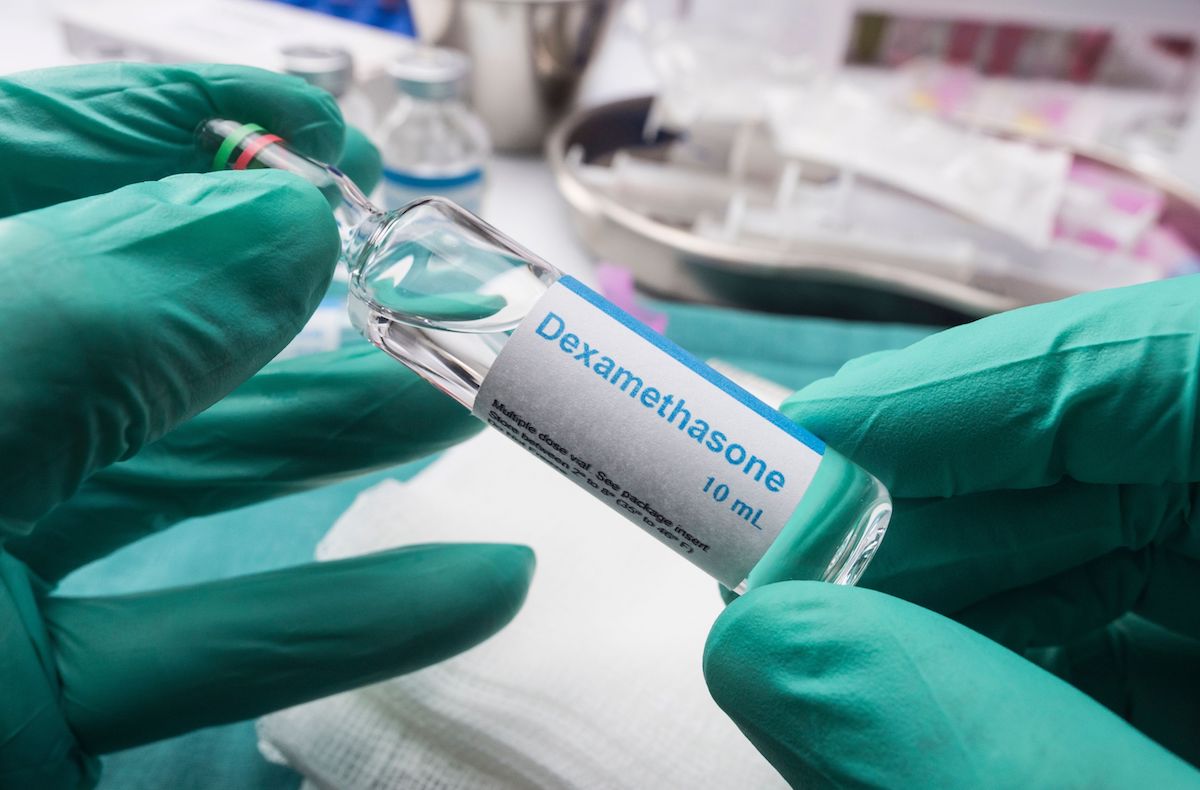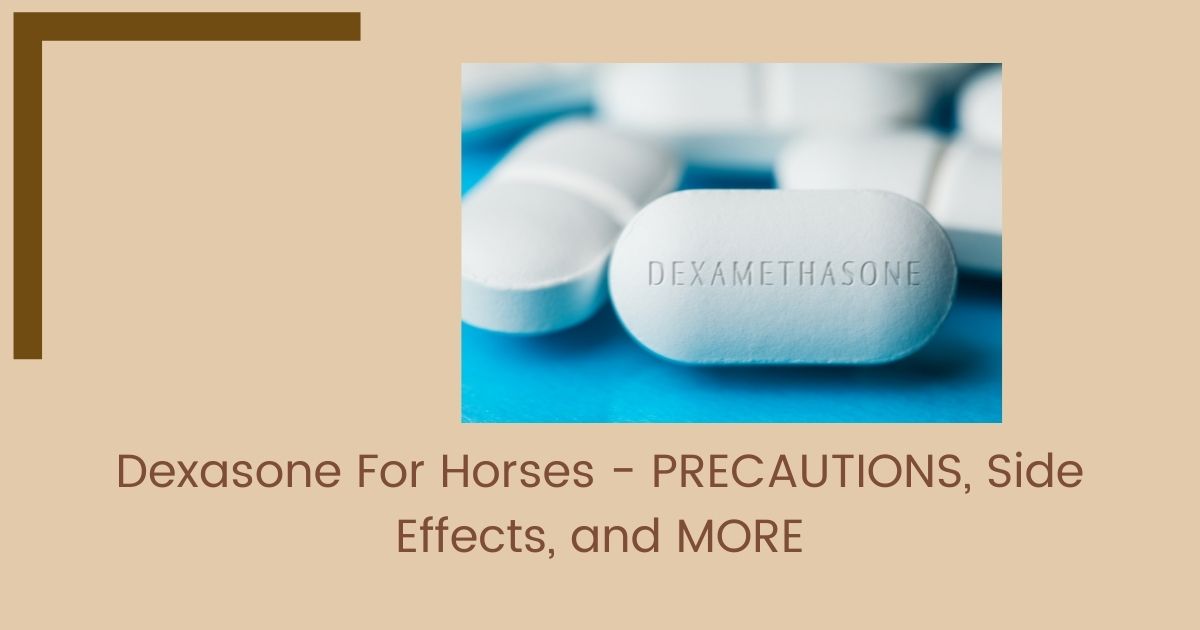What is Dexamethasone?
It is marketed as Dexasone for horses. Dexamethasone is an anti-inflammatory drug used in horses that have some kind of illness or disorder where the immune system is involved. As a synthetic corticosteroid hormone, it can bring down inflammation believed to be caused by certain illnesses or disorders.
However, it is a potent drug that should be used with caution under the guidance of a qualified veterinarian due to possible side effects.

General Drug Information on Dexasone for Horses
The drug known as Dexasone is also used to treat other animals such as cats, dogs, and even cattle. But it is usually known as steroids for horses. Veterinarians prescribe this drug for common illnesses or disorders such as allergic reactions, rheumatic symptoms, dermatologic problems, and even certain auto-immune conditions.
The dexamethasone dosage horses are given for emergencies is often more significant than those for other therapeutic purposes. If the horse does not urgently need steroids, refrain from providing the drug without a veterinarian’s prescription.
If the situation warrants it, a veterinarian may prescribe dex for horses in cases of shock, spinal cord injuries, or anaphylactic reactions. In these situations, the vet may increase the dexamethasone dose for horses. Take note that the vet may increase the dosage too if an auto-immune disorder is being treated.
Possible Drug Indication in Horse Steroids
Generally, the veterinarian will set the exact equine dexamethasone dosage depending on which symptoms are manifesting. Since this substance is so strong, a vet will take into account possible side effects. The predominant drug indication is usually for inflammation.
This is why the animal has to be under the care of a veterinarian during the administration of the oral dexamethasone dosage for horses. Sometimes, a dexasone injection is given instead. There are also cases where an aerosol version is desirable. This really depends on the judgment call of the veterinarian.
It is equally possible that the vet will prescribe dexamethasone for horses with heaves. Heaves is the common name given to a veterinary condition known as Rapid Airway Obstruction. Dexamethasone may be given first to clear away the inflammation. Then a bronchodilator could be administered so that any air passages that have contracted will open up.
(In the event that the vet eliminates dexamethasone as the drug of choice, you may ask if fluticasone is a good alternative. This is another type of corticosteroid that tends to be used in aerosol form with bronchodilators too.)
Are There Any Side Effects to Using Dexasone for Horses?
Yes, there are some dexamethasone side effects in horses when equine dexamethasone dosage is considered. One of the most common side effects is laminitis (due to the drug being a corticosteroid). Ask the veterinarian to check if your horse or pony manifests some risk factors for developing laminitis.
In case the duration of treatment is extended, you may observe polydypsia (larger volume of water drunk) and polyuria (higher volume of urination) in the horse being treated. Muscle wasting is also possible.
If the animal is on some calcium supplements, this is contraindicated for use with dexamethasone. Dexamethasone should also not be combined with any NSAIDs or other substances used to treat gastric ulcers.
It should be noted that a veterinarian will usually prescribe dexamethasone for a chronic condition for a long duration, such as weeks or even months. This is so the symptoms can be controlled. Then, if the vet feels that the symptoms have been controlled enough, they will start to taper off the dosages until the animal seems to be producing its own hormones.
This is very important so that the animal’s own adrenal glands do not totally stop producing hormones and start to atrophy. But do not attempt to halt the drug regimen on your own. Instead, the veterinarian should be guiding you in this process for the good of the animal.
One risk with the use of dexamethasone therapy is that dormant infections may flare up. Another risk is that the animal may develop urinary tract infections that go unnoticed due to the anti-inflammatory effect of the drug. The animal may also become predisposed to developing diabetes mellitus if the dexamethasone therapy is prolonged.
Some horses may develop a panting behavior, loss of appetite, vomiting, or diarrhea. If you notice this, alert the attending veterinarian right away.
In addition, dexamethasone mustn’t be used with another corticosteroid simultaneously. The vet will also want to avoid using NSAIDs with dexamethasone to prevent internal gastric bleeding. The animal should not be placed on macrolide antibiotics or ketoconazole (an antifungal antibiotic) while dexamethasone is being administered since blood levels may spike significantly.
On the other hand, if any diuretics are being administered, the vet will check if the blood potassium levels fell. Diuretics must never be used in tandem with dexamethasone.

Precautions to Prescribing Dexasone for Horses
You may be wondering how much dexamethasone to give a horse. First, note that a veterinarian is trained in treating horses using this drug, so avoid medicating the animal without veterinary guidance. You should also refrain from adjusting the dosage on your own.
Corticosteroid hormones are actually naturally occurring substances in horses. So when the animal is under horse steroids and seems to be recovering, the vet may slowly wean the horse off the substance. This will allow the animal to resume normal production of its own corticosteroid hormones.
However, even if you have some experience dosing a horse with the substance, it is not really a good idea to halt the drug regimen suddenly. Instead, it is always advisable to ask your vet if it is safe to slowly wean the horse off the drug at a certain point.
Suppose the horse is already under other medication. In that case, you may ask the veterinarian to provide you with a list of horse steroids that are relatively safe for use with those previously administered medications. It is a good idea to do your own research about any medication, especially at the onset of the symptoms.
If your animal is already on other steroidal medications such as methylprednisolone, prednisolone, or prednisone, you should inform the vet before dosing it with dexamethasone. This also applies in the case of furosemide (a diuretic) because of possible electrolyte imbalance developing.
The vet may also ban the use of dexamethasone while the animal is being tested for blood liver enzymes and possible thyroid disorders.

More on Dexamethasone as a Corticosteroid
Dexamethasone is a very powerful drug, no matter which animal you administer it to. Therefore, some veterinarians may prescribe it for other animals such as dogs and cats. The side effects for dogs and cats can be diarrhea (which may be bloody at times) and vomiting.
If these tend to occur in your horse, ask the vet if the animal patient should be weaned off the drug or switched to a different yet similar drug.
If the animal being treated is pregnant, you should not put it on a dexamethasone treatment regimen. This is because the pregnant animal may have a miscarriage. You may also observe other undesirable side effects in the pregnant animal if it is given the drug.
Dexamethasone is contraindicated in animal patients with the following conditions:
- Viral infections
- Peptic ulcers
- Cushings’ disease
- Chronic nephritis
- Tuberculosis
However, in an emergency, the veterinarian may opt to give dexamethasone to patients with these conditions anyway.
Available Forms of Dexasone for Horses
Azium is another brand name for dexamethasone. It is available as an injectable solution.
Vorem is another branded form of dexamethasone.
The Final Neigh
Dexamethasone is a very powerful drug in itself. You need to respect that kind of potency by considering what the drug can do to an animal patient. This drug is actually much more powerful than other similar drugs such as prednisolone and prednisone. To assure the safety of the animal patient, a vet may ask for monitoring tests to be done regularly.
It should be stressed that dexamethasone is not the same as anabolic steroids associated with illegal muscle growth in human bodybuilders and professional athletes. Instead, the drug belongs to the group of catabolic steroids. These substances work by breaking down sugars, fats, and proteins in the animal’s body to serve as an alternative fuel during stressful situations.
If your animal is experiencing symptoms of a chronic condition, the vet may recommend the use of dexamethasone for some time. This is a balancing act in itself since the veterinarian is aware that prolonged use can fool the animal’s adrenal glands into not producing enough hormones of their own. Therefore, to protect the animal, the vet may at some point start to taper off the use of dexamethasone.
Should you wish to wean off the animal patient from the dexamethasone, it is always a good idea to do this with the guidance of the attending vet. The vet will know what the safe levels of the drug for that particular animal are and how much the dosages should be reduced over time. This way, your horse (and other animals) will be safe, and there will be minimal side effects.
The good news, though, is that the veterinary profession has judged the impact of dexamethasone use on animal patients over the years. The substance can still be used, but vets are aware of the risks as well. So if your horse seems to be having a chronic inflammatory condition, don’t be surprised if the vet prescribes dexamethasone. This may be best for the animal.
You have a part to play in the welfare of the horse that is the patient. You will be expected to observe the animal closely over time while the drug is still being administered. You will then have to report your observations to the vet so that they are well-advised about the progress of the animal’s health. With patience and tender loving care, your horse may recover its health soon enough.
